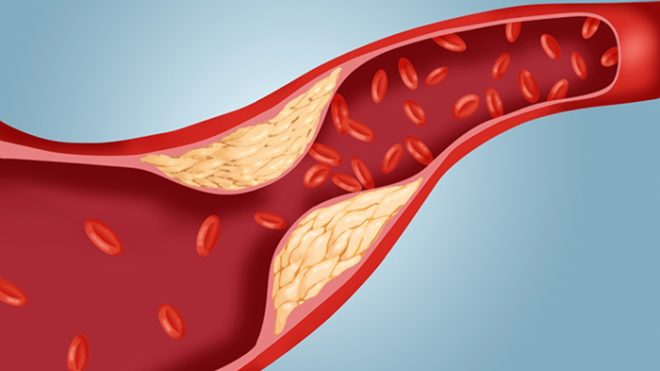For many people, when they hear the word “Cholesterol”, the mind immediately flashes to egg yolk. Yes it is found in egg yolk, however there’s so much more to know about cholesterol.
Cholesterol is a natural substance made by the body. Most of the cholesterol in our bloodstream (75%) is produced by the liver, and the remaining 25% comes from the foods we eat.
While elevated blood cholesterol levels are not good for your health, the right levels of cholesterol actually play a vital role in maintaining several normal functions of the body.
High Cholesterol Symptoms
Usually, high cholesterol does not produce any symptoms and you may not know your blood cholesterol is too high. Too much cholesterol can build up in your arteries, causing atherosclerosis, or hardening of the arteries. This reduces the amount of blood that can pass through the arteries and can lead to serious medical problems such as heart attack or stroke.
Cholesterol Testing
It is recommended that all adults over age 20 should have their cholesterol levels checked every four to six years. Cholesterol screening is done with a blood test that measures three things. These are:
- High-density lipoprotein (HDL) cholesterol (“good” cholesterol)
- Low-density lipoprotein (LDL) cholesterol (“bad” cholesterol)
- Triglycerides
LDL Cholesterol: ‘Bad’ Cholesterol
Low-density lipoprotein (LDL) cholesterol, often referred to as “bad” cholesterol, is the type that tends to deposit on the walls of the arteries, forming artery-narrowing plaque, which restricts blood flow.
HDL Cholesterol: ‘Good’ Cholesterol
Not all cholesterol is bad. High-density lipoprotein (HDL) cholesterol is considered “good” cholesterol because it actually works to keep the LDL, or “bad” cholesterol from building up in your arteries. The higher the HDL, the better. HDL levels of 60 mg/dL and higher can help reduce your risk for heart disease. Conversely, HDL levels of 40 mg/dL and lower are considered a high risk factor for developing heart disease.
Cholesterol and Family History
Eating foods high in cholesterol and saturated fat is not the only cause for high cholesterol levels in some people. For many, genetics are to blame. A genetic condition called familial hypercholesterolemia can cause high blood cholesterol levels.
Cholesterol and Gender
Women generally have higher levels of HDL, or “good,” cholesterol because the female hormone estrogen tends to raise HDL levels. This is why most women tend to have lower cholesterol levels than men. Unfortunately this only lasts until menopause, after that, triglyceride levels start to rise. As women approach menopause it becomes more important to eat a healthy diet, and maintain a healthy weight to help manage blood cholesterol levels.

Why High Cholesterol Matters
High cholesterol puts you at risk for heart disease and stroke. High levels of LDL (“bad”) cholesterol can contribute to plaque buildup on the walls of the arteries, narrowing the arteries and restricting blood flow. If some of this plaque breaks off and gets stuck in a narrowed artery, it can block the artery and cut off blood supply to the heart or brain, resulting in heart attack or stroke.
Some things you can do to maintain a balanced cholesterol level include:
Smart Protein: limit red meat and eat more fish and lean poultry.
Lose Weight: Losing weight can help lower your cholesterol. Being overweight or obese tends to increase your levels of LDL (“bad”) cholesterol. Weight loss can help reduce LDL cholesterol and triglyceride levels, and raise your HDL (“good”) cholesterol levels.
Exercise: Exercise can increase your HDL (“good”) cholesterol by up to 6% and reduce your LDL (“bad”) cholesterol by 10%. Just 40 minutes of exercise such as walking, swimming, or cycling three to four times per week can have an impact on blood cholesterol levels. Talk to your doctor about starting an exercise program.
Quit Smoking: Smoking is not only bad for your lungs; it also lowers your HDL (“good”) cholesterol and increases your risk for heart disease and stroke. When you quit smoking, your HDL levels will rise.’
Supplements: Several nutritional supplements have been shown to be beneficial in improving cholesterol levels.
Nutritional Supplements That Help Lower Cholesterol
Fish oil can reduce triglycerides, and soy protein can slightly lower levels of LDL (“bad”) cholesterol and triglycerides and raise HDL (“good”) cholesterol.
Plant stanols and sterols naturally found in some fruits, vegetables, nuts, seeds, and legumes may help block absorption of cholesterol in the intestine.
Prescription nicotinic acid (niacin or vitamin B3) is often prescribed to improve cholesterol. Doses found in over-the-counter vitamin supplements are not sufficient to treat high cholesterol, and because of the potential for side effects, high doses should only be taken under a doctor’s supervision.
Cholesterol Medications
Sometimes, a healthy diet and regular exercise just aren’t enough to attain healthy cholesterol levels. This is often the case when high cholesterol is caused by genetic factors, and in these situations, medications can help. These should only be taken when prescribed by a doctor after proper testing has been done.
You don’t need to deprive yourself of nutritious egg yolks just because you’re afraid of cholesterol, just don’t overdo things and be sure to get routine blood tests to check your cholesterol levels.






